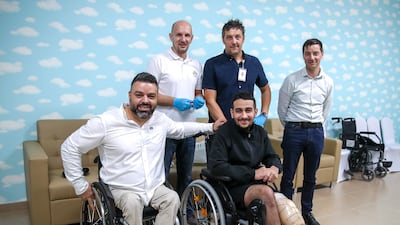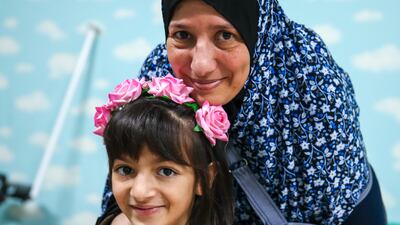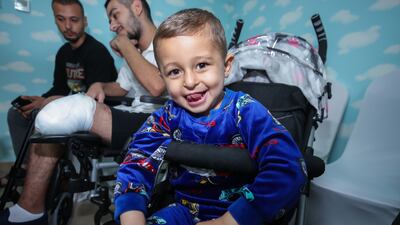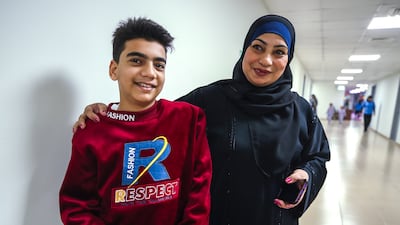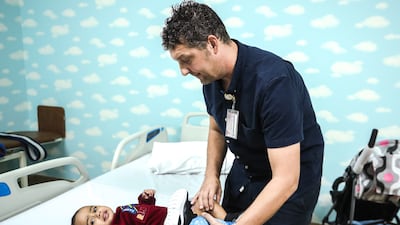Live updates: Follow the latest news on Israel-Gaza
A humanitarian compound in Abu Dhabi is offering a lifeline to survivors of the conflict in Gaza.
About 1,000 Palestinians, including children, have found respite in Emirates Humanitarian City.
From psychological support and educational opportunities, the city has become a sanctuary for those whose lives have been irrevocably altered by the war in Gaza.
The National spoke to Palestinians staying at EHC, each clinging on to hope despite their harrowing experiences that led them here.
Their stories are heartbreaking and distressing but offer an important insight into the harsh realities of war that they and many of their fellow Gazans have endured.
Mohamed Elmadhoun, 18, had a prosthetic leg fitted. He was at his grandfather’s house in Gaza when they got the news early in the morning that they needed to move to a safer place.
As they headed to a safer location, the air strikes hit, killing his mother and wounding him in the leg.
At the hospital, Mohamed said doctors inserted steel rods in his leg and cauterised the wound to stop the bleeding. They proceeded to amputate a few weeks later.
“There was no sterilisation or any anaesthesia. My dressings were rarely changed and the pain was unbearable,” he said.
Mohamed arrived in the UAE on December 8 with his father and sister, who were also wounded.
Lama Suhel Mady, 11, and her mother Sabreen Musa Mady, 45, survived an air strike that killed 45 people in one building.

The building was previously a refuge for Palestinians moving from the south, and the owners had opened it up to Gazans, allowing about 70 people to take shelter in it.
More than 20 members of Ms Mady’s extended family were killed, including a daughter whose body remains undiscovered to this day.
Lama, her youngest, survived because she was at the bottom of the building at the time, playing with her cousin. However, her pelvis was fractured.
“We were at home preparing for lunch when, suddenly, I felt myself flying in the air and landing on the street,” the mother of six said.
The family was on the second floor of the two-storey building. All those on the upper floors were killed.
Lama is in the sixth grade and longs to go back to school.
“I remember being alone and calling out for my father. I couldn’t feel my legs and there were so many bodies around me,” she said.
The Health Ministry in Gaza estimates that about 25,000 people have been killed since October 7, with up to 70 per cent of them reportedly women and children.
Hope remains despite the ordeals
One-year-old Rakan stood up for the first time recently with his grandmother Manal Abdulla, 46, by his side.
He was able to stand thanks to a prosthetic leg installed at the EHC.
Rakan also lost a leg and hearing after a bomb hit the building where he was with his family.
He was pulled from under the rubble with his leg detached from the rest of his body, so it is no exaggeration to say he is lucky to be alive today.

Despite all those horrific setbacks, he remains a happy child, much to the delight of his grandmother.
He claps with his hands and smiles at her before plonking himself down again.
“One moment I was flying and in the next, I was on the road. It was sudden,” Ms Abdulla told The National, describing the moment the bomb hit, forever changing their lives.
“There wasn’t a bang or any noise. I was told that I was thrown out of the third floor and my eldest daughter, who was sitting next to me at the time, had died, along with three of our neighbours.
“It was all women, because it was when all the women were at home cooking. When I opened my eyes, I started screaming for my children and asking if they were OK.”
Ms Abdulla said coming to the Emirates felt like she had been given a lifeline.
“We came with open wounds and escaping inevitable death. Rakan only had a bandage on to stop the bleeding and when we arrived here, doctors removed a large stone from his other leg that doctors had sewn over,” she said.
“Our doctors are overwhelmed. They have worse cases than a baby that lost his entire leg.
“My eldest daughter bled to death on a hospital floor. Her injuries were so severe that there was no point in even trying to save her life.”
Escaping the horror of war
The impact of what is happening in Gaza cannot be overstated, said another survivor.
“In Gaza, you either die on a hospital floor or in your house. You are dead either way. Nowhere is safe,” said Laila Ibrahim, 50.
“I ran from a bomb that hit the supermarket I was in before realising that I was holding on to the amputated hand of my 13-year-old son.
“I hadn’t let go of Malak’s hand and just screamed to him to quickly run with me in case another bomb lands on us. I just ran outside and I remember wondering why it felt so light and why it felt like something was hitting against my thigh.”
That turned out to be her son's arm hitting against her thigh.
“I looked back and found Malak in the distance reciting his Tashahhud [a prayer said before one dies],” she said.
Malak lived and was fitted with a prosthetic arm at the EHC last week. He remembers little of that day and has had problems with his memory since the air strike.
“I know that if not for the UAE, our lives and Malak’s would have turned out very differently,' she said.
“We are grateful to have been let out and to be here.”

Tahany El Refe, 37, has brain, blood and thyroid cancer but refuses to be anything but upbeat, hoping to inspire others to have a positive outlook towards life.
When she goes to her chemotherapy sessions, she says she is going for a stroll in the park, and when she takes her chemotherapy tablets, she tells everyone that they are sweets. She is adamant that Gaza will be beautiful again.
Mohamed Ahmed, 10, is on dialysis every day because of kidney failure. He lost his mother and most of his family in the war.
“What do I say about Gaza? It used to be heaven” he said.
“Would you believe me if I told you that it is worse than judgment day – you have the rockets coming in from under you and above you and it feels like it is going through your body and is inside your head; the ground shakes and rumbles.
“I don’t want to go back. What do I go back to? There is nothing called Gaza any more.
“This here now, being in the UAE, is heaven.”
Providing a lifeline
Mubarak Al Qahtani, a spokesman for the EHC, spoke to The National about the tight-knit community that has already emerged among the survivors living there.
“They are not just guests; they're like family to us. Our goal is to make this place feel as much like home as possible, despite the circumstances,” Mr Al Qahtani said.
Staff work diligently to create a comfortable environment, focusing on personal care and a sense of community.
With a capacity for 10,000, EHC is very much a small city in every sense, with a football field, children’s outdoor and indoor play areas, a clinic and even its own mosque.
There are 6,500 en suite rooms within EHC, as well as large canteens and restaurants that serve food throughout the day.
There is also a nursery for babies and young children under five, and adult classrooms for older pupils.
There are currently about 1,000 Palestinians living in EHC, Mr Al Qahtani said, with many more expected to join them.
